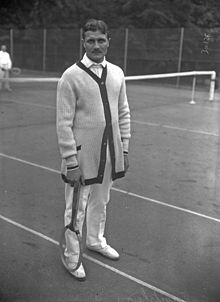Otto Froitzheim

Froitzheim in 1913
|
|||||||||||||
| Country (sports) | Germany | ||||||||||||
|---|---|---|---|---|---|---|---|---|---|---|---|---|---|
| Born |
24 April 1884 Strasbourg, German Empire |
||||||||||||
| Died | 27 October 1962 (aged 78) Wiesbaden,West Germany |
||||||||||||
| Plays | Right-handed (one-handed backhand) | ||||||||||||
| Singles | |||||||||||||
| Career titles | 20 | ||||||||||||
| Highest ranking | No. 4 (1914, A. Wallis Myers) | ||||||||||||
| Grand Slam Singles results | |||||||||||||
| French Open | QF (1927) | ||||||||||||
| Wimbledon | F (1914) | ||||||||||||
| Other tournaments | |||||||||||||
| WHCC | W (1912) | ||||||||||||
| Olympic Games |
|
||||||||||||
| Doubles | |||||||||||||
| Grand Slam Doubles results | |||||||||||||
| French Open | 3R (1930) | ||||||||||||
| Wimbledon | 2R (1912) | ||||||||||||
| WHCC | W (1912) | ||||||||||||
| Team competitions | |||||||||||||
| Davis Cup | SF (1913, 1914) | ||||||||||||
|
Medal record
|
|||||||||||||
Otto Froitzheim (German pronunciation: [ɔto fʀøːtshaɪ̯m]; 24 April 1884 – 27 October 1962) was a German tennis player.
Froitzheim was born in Strasbourg, then part of the German Empire, on 24 April 1884. His father worked as a teacher at the local lyceum and his mother was the daughter of a doctor from the Rhineland. During his childhood, he practised several sports including athletics, swimming, ice skating and football. At the age of 16, he began playing tennis.
After graduating from school with the Abitur in 1901, Froitzheim began to study law at the University of Strasbourg. In 1902, he interrupted his studies for one year and served at the 138th infantry regiment at Strasbourg. In autumn 1903, following his military service, he continued his studies at the University of Bonn. In 1904, he passed the first law examination. In 1909, at an age of 25, he finished his studies with the second examination. Froitzheim then worked at the customs at Strasbourg.
Being kept a prisoner of war in an English detention camp for the duration of World War I, Frotzheim returned to Strasbourg in 1918 until Alsace-Lorraine was occupied by French forces. He then moved to Berlin, where he got a job in the police department with the task of fighting usury. Working as deputy police president at Cologne from 1923, he was assigned police president of Wiesbaden in autumn 1926. When the Nazi Party came to power in 1933, he was forced to quit because he refused to join the SA. However, with the support of Hermann Göring, who admired Froitzheim's successful international tennis career, Froitzheim was assigned vice president of the government at Aachen.
...
Wikipedia
